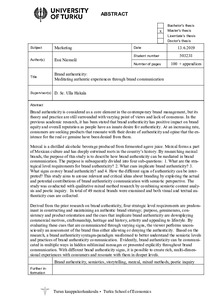Brand authenticity : meditating authentic experiences through brand communication
Niemelä, Essi (2019-06-14)
Brand authenticity : meditating authentic experiences through brand communication
Niemelä, Essi
(14.06.2019)
Julkaisu on tekijänoikeussäännösten alainen. Teosta voi lukea ja tulostaa henkilökohtaista käyttöä varten. Käyttö kaupallisiin tarkoituksiin on kielletty.
avoin
Julkaisun pysyvä osoite on:
https://urn.fi/URN:NBN:fi-fe2019062621988
https://urn.fi/URN:NBN:fi-fe2019062621988
Tiivistelmä
Brand authenticity is considered as a core element in the contemporary brand management, but its theory and practice are still surrounded with varying point of views and lack of consensus. In the previous academic research, it has been stated that brand authenticity has positive impact on brand equity and overall reputation as people have an innate desire for authenticity. At an increasing rate, consumers are seeking products that resonate with their desire of authenticity and opine that the existence for the real or genuine have been denied from them.
Mezcal is a distilled alcoholic beverage produced from fermented agave juice. Mezcal forms a part of Mexican culture and has deeply entwined roots in the country’s history. By researching mezcal brands, the purpose of this study is to describe how brand authenticity can be mediated in brand communication. The purpose is subsequently divided into four sub-questions: 1. What are the strategical level requirements for brand authenticity? 2. What cues implicate brand authenticity? 3. What signs convey brand authenticity? and 4. How the different signs of authenticity can be interpreted? This study aims to arouse relevant and critical ideas about branding by exploring the actual and potential contributions of brand authenticity communication with semiotic perspective. The study was conducted with qualitative mixed method research by combining semiotic content analysis and poetic inquiry. In total of 49 mezcal brands were examined and both visual and textual authenticity cues are collected.
Derived from the prior research on brand authenticity, four strategic level requirements are predominant in constructing and maintaining an authentic brand strategy; purpose, genuineness, consistency and product orientation and the cues that implicate brand authenticity are downplaying commercial motives, craftsmanship, heritage and history, artistry and appealing to lifestyle. By evaluating these cues that are communicated through varying signs, the viewer performs unconsciously an assessment of the brand thus either allowing or denying the authenticity. Based on the research, a brand authenticity syntagma-paradigm was formed to better understand the semiotic levels and practices of brand authenticity communication. Evidently, brand authenticity can be communicated in multiple ways in hidden subliminal messages or presented explicitly throughout brand communication. With different brand authenticity signs, it is possible to create rich, multi-dimensional experiences with consumers and resonate with them in deeper levels.
Mezcal is a distilled alcoholic beverage produced from fermented agave juice. Mezcal forms a part of Mexican culture and has deeply entwined roots in the country’s history. By researching mezcal brands, the purpose of this study is to describe how brand authenticity can be mediated in brand communication. The purpose is subsequently divided into four sub-questions: 1. What are the strategical level requirements for brand authenticity? 2. What cues implicate brand authenticity? 3. What signs convey brand authenticity? and 4. How the different signs of authenticity can be interpreted? This study aims to arouse relevant and critical ideas about branding by exploring the actual and potential contributions of brand authenticity communication with semiotic perspective. The study was conducted with qualitative mixed method research by combining semiotic content analysis and poetic inquiry. In total of 49 mezcal brands were examined and both visual and textual authenticity cues are collected.
Derived from the prior research on brand authenticity, four strategic level requirements are predominant in constructing and maintaining an authentic brand strategy; purpose, genuineness, consistency and product orientation and the cues that implicate brand authenticity are downplaying commercial motives, craftsmanship, heritage and history, artistry and appealing to lifestyle. By evaluating these cues that are communicated through varying signs, the viewer performs unconsciously an assessment of the brand thus either allowing or denying the authenticity. Based on the research, a brand authenticity syntagma-paradigm was formed to better understand the semiotic levels and practices of brand authenticity communication. Evidently, brand authenticity can be communicated in multiple ways in hidden subliminal messages or presented explicitly throughout brand communication. With different brand authenticity signs, it is possible to create rich, multi-dimensional experiences with consumers and resonate with them in deeper levels.
